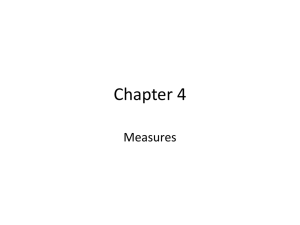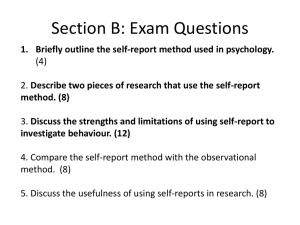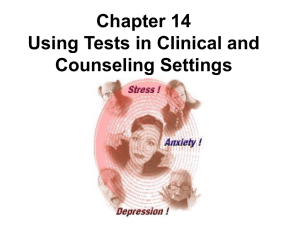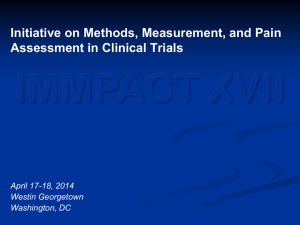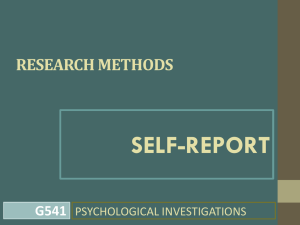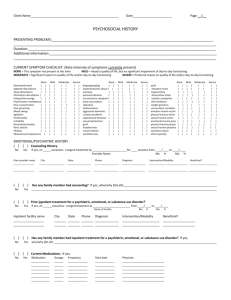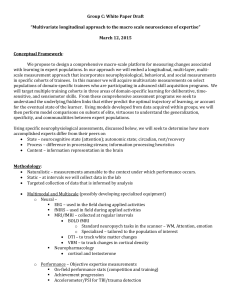College Outcomes Project Measurement Tools
advertisement
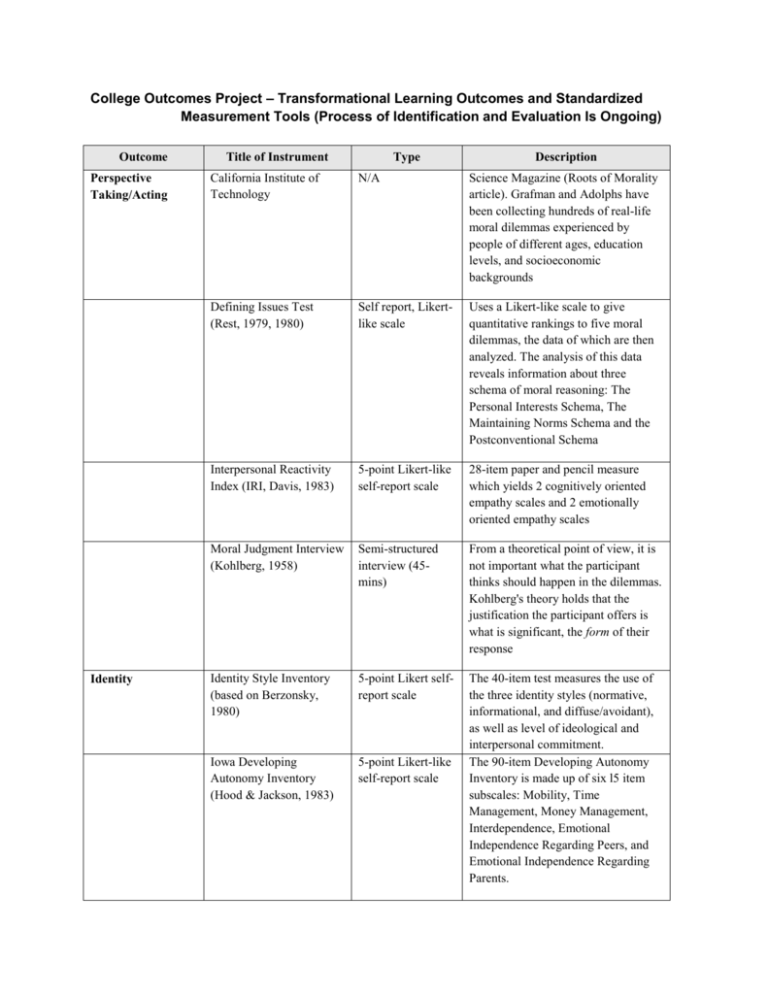
College Outcomes Project – Transformational Learning Outcomes and Standardized Measurement Tools (Process of Identification and Evaluation Is Ongoing) Outcome Perspective Taking/Acting Identity Title of Instrument Type Description California Institute of Technology N/A Science Magazine (Roots of Morality article). Grafman and Adolphs have been collecting hundreds of real-life moral dilemmas experienced by people of different ages, education levels, and socioeconomic backgrounds Defining Issues Test (Rest, 1979, 1980) Self report, Likertlike scale Uses a Likert-like scale to give quantitative rankings to five moral dilemmas, the data of which are then analyzed. The analysis of this data reveals information about three schema of moral reasoning: The Personal Interests Schema, The Maintaining Norms Schema and the Postconventional Schema Interpersonal Reactivity Index (IRI, Davis, 1983) 5-point Likert-like self-report scale 28-item paper and pencil measure which yields 2 cognitively oriented empathy scales and 2 emotionally oriented empathy scales Moral Judgment Interview (Kohlberg, 1958) Semi-structured interview (45mins) From a theoretical point of view, it is not important what the participant thinks should happen in the dilemmas. Kohlberg's theory holds that the justification the participant offers is what is significant, the form of their response Identity Style Inventory (based on Berzonsky, 1980) 5-point Likert selfreport scale Iowa Developing Autonomy Inventory (Hood & Jackson, 1983) 5-point Likert-like self-report scale The 40-item test measures the use of the three identity styles (normative, informational, and diffuse/avoidant), as well as level of ideological and interpersonal commitment. The 90-item Developing Autonomy Inventory is made up of six l5 item subscales: Mobility, Time Management, Money Management, Interdependence, Emotional Independence Regarding Peers, and Emotional Independence Regarding Parents. Emotional Competence Objective Measure of Ego Identity Status (Bennion & Adams, 1986) 6-point Likert-like self-report scale Extended version (64 items) and revised version (28 items) PSS-10 (Cohen & Williamson, 1988) 5-point Likert like self report scale The PSS-10 measures the degree to which one perceives aspects of one's life as uncontrollable, unpredictable, and overloading. Rosenberg’s Self-Esteem Scale (1979) 4-point scale (selfreport) Consists of 10 statements related to overall feelings of self-worth or selfacceptance. The items are answered on a four-point scale ranging from strongly agree to strongly disagree. The SES has also been administered as an interview. Self-Authorship Survey, rev. (Pizzolato, 2008) 5 point Likert-like scale (self-report) and a short answer experience section 40 items. Asks questions about students’ preferences and feelings about making decisions. Assesses both self-authored reasoning and action. Self-Control Scale (Grasmick et al. 1993) 5-point Likert-like scale (self-report) The scale contains total of 36 items, four questions form each of the six categories (impulsivity, simple task, risk seeking, physical activities, selfcenteredness, and temper.) Test of Self-Conscious Affect (TOSCA, Tangney, Wagner & Gramzow, 1989) See description section Consists of 10 negative and 5 positive scenarios taken from personal accounts of shame, guilt, and pride from several hundred college students and other older adults. Participants are asked to imagine themselves in the scenarios. They then rate their likelihood of responding to each scenario with shame and guilt on a scale of 1, not likely, to 5, very likely. Reponses are summed across scenarios to obtain scores for the guilt and shame subscales. Emotional Competence Inventory (Goleman, 1988) 7-point Likert -like self-report scale The ECI measures 18 competencies organized into four clusters: SelfAwareness, Self-Management, Social Awareness, and Relationship Management. Resilience College Environment Emotional Quotient Inventory (Bar-On, 2006) Self-report (133 questions) It gives an overall EQ score as well as scores for the following five composite scales and 15 subscales: Intrapersonal, interpersonal, stress management, adaptability, and general mood Mayer-Salovey-Caruso Emotional Intelligence Test (MSCEIT) Ability test (141 items), predominantly self-report, fill-in the blank multiple choice The Mayer-Salovey-Caruso Emotional Intelligence Test (MSCEIT) is an ability-based test designed to measure the four branches (perceiving emotions, facilitating thought, understanding emotions, managing emotions) of the EI model of Mayer and Salovey. Brief Cope Scale (Carver, 1989) 4-point Likert-like self-report scale 28 questions. 1=I usually don’t do this; 4=I usually do this a lot. Proactive Coping Inventory (PCI, Greenglass et al, 1999) 4-point self-report scale 55 items Proactive Coping Inventory (PCI, Greenglass et al, 1999) 4-point self-report scale 55 items Resiliency Attitudes Scale (Biscoe & Harris, 1994) 5-point Likert-like self-report scale 72 items were developed to tap attitudes that would reflect each of the seven resiliencies the Wolin's identified while working with their clients: Insight, Independence, Relationships, Initiative, Creativity and Humor, and Morality. CIRP (Cooperative Institutional Research Program) Self reports ranging from 3point to 5-point Likert-like scales and true/false Two tests: 1. Freshman survey (28 main questions with a number of subquestions), 2. Senior survey (34 main questions with a number of subquestions) CSEQ - College Student Experiences Questionnaire (Pace &Kuh, 1987) Self report Likertlike scale Assesses student involvement and use of educational resources Learning Environment Preferences (Moore, 4-point Likert-like self-report scale The LEP addresses five domains which include course content, the 1987) roles of instructors and peers, classroom atmosphere and activities, and course evaluation. Each domain includes 13 statements which a student rates (not at all significant to very significant). The student focuses on the level of significance of each task in their learning environment. National Study of Student Engagement (NSSE) 4-point to 7-point Likert-like selfreport scale Assesses student participation in programs and activities that institutions provide for their learning and personal development. The results provide an estimate of how undergraduates spend their time and what they gain from attending college. Mental Health Continuum (Keyes) 5-point to 7-point Likert type selfreport scale Long form and short form (14 questions). Mental health continuum is measured (languishing, moderate mental health, and flourishing) NEO PI-R Personality Inventory, revised (Costa & McCrae) 5-point scale (one a self-report, another an observer rating) 240 questions (each) for both types of assessments on Five Factor model: Openness, conscientiousness, extraversion, neuroticism, agreeableness Outcome Questionnaire 45 (OQ45, Lambert, Lunnen, Umphress, Hansen & Burlingame, 1994) Self-report 45 items. Measures personally and socially relevant characteristics associated with school work and stressors. Has an associated feedback system, which provides therapists with feedback about their clients' treatment progress Social Desirability Marlowe-Crowne Social Desirability Scale (1960) Self-report (true/false) As originally developed, this measure contains 33 true-false items that describe both acceptable but improbable behaviors, as well as those deemed unacceptable but probable. Omnibus (Measures Multiple PIER Construct Facets) Personal and Social Responsibility Institutional Inventory (PSRII) Self-report scale for attitude & behavior items; open-ended items relating to experiences, Part of AACU’s Core Commitments initiative. Assesses college environment along 5 dimensions of personal and social responsibility Flourishing programs & practices PISA – Student Approaches to Learning 4-point scale (selfreport) 52 items. Designed to assess learner differences with constructs representing both “states” and “traits”. To assess learner “traits” the instrument assesses certain learning styles. Learner “states” are assessed by examining factors related to student motivation and strategy use.
